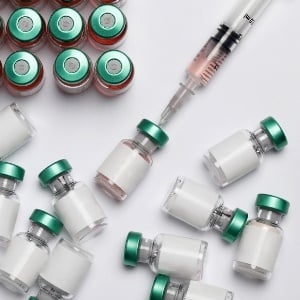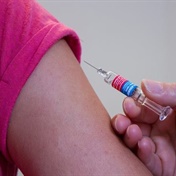
When it becomes obvious from the typical rash that someone has measles (rubeola), he or she has already been infectious for about three days. However, contact with others should still be avoided for five days after the rash appears. School-aged children should remain out of school for this period.
It should be noted that someone exposed to measles may be incubating the virus and, if so, is regarded as being infectious for about nine days after exposure. This is important to know if you want to protect vulnerable persons, for example babies, immune-compromised persons and anyone with chronic illness.
In the event of exposure of a vulnerable person, measles can be prevented or modified to a variable extent by giving immunoglobulin (a protein capable of acting as an antibody) by intramuscular injection within five days. Immunoglobulin is prepared from adult serum that contains antibodies to measles,and provides "instant immunity".
Measles vaccination
Routine measles vaccination is given at 9 and 15 months in South Africa. The vaccination at 15 months is given as the combined measles, mumps and rubella (MMR) vaccine.
Vaccination of children younger than 9 months isn’t reliable because the mother’s antibodies that are still present in the child’s blood can neutralise the vaccine. On the other hand, these antibodies give some natural protection to children in the first months of life.
In recent years, universal vaccination days for measles and polio have been arranged by the Department of Health in South Africa. These are days when all children under 5 years should receive the vaccine, regardless of their previous vaccination record. This is done in an effort to cover not only those children who haven’t received the vaccine for some reason, but also the small percentage of children in whom the vaccine doesn’t “take” or work.
In any event, a booster vaccine helps to give long-term immunity.
The measles vaccine is a live measles virus that has been specially weakened or attenuated by culturing techniques in the laboratory. After inoculation, the measles vaccine virus will infect a person and cause the proper, protective immune response without actually causing measles.
However, about 20% of infants develop a mild fever (37.5°C) and a slight rash, usually three to four days after vaccination. This mild fever usually lasts for about 24 hours, and then returns to normal.
Unfortunately, about one in a million children who has been given the vaccine will get an “allergic” type of encephalitis (compared to the 1/1,000 risk after natural measles infection). There’s also a one per million risk of sub-acute sclerosing pan-encephalitis (SSPE) – an extremely rare but dreaded condition which usually occurs many years after measles infection.
Measles vaccine is recommended for children with HIV infection because they’re at risk for severe measles. They tolerate the vaccine surprisingly well.
Reviewed by Prof Eugene Weinberg, Paediatrician at the University of Cape Town’s Allergy and Immunology Unit. April 2018.




 Publications
Publications
 Partners
Partners















